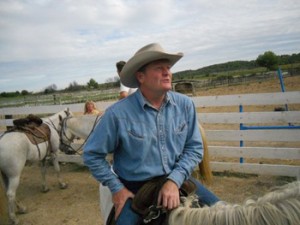Lois Banner: Marilyn: The Passion and the Paradox
September 13, 2012 by David
Filed under Non-Fiction, WritersCast
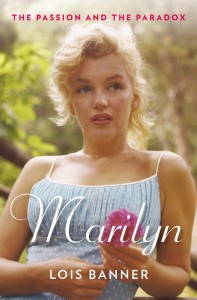 978-1608195312 – Bloomsbury USA – Hardcover – $30.00 (ebook editions available, prices vary)
978-1608195312 – Bloomsbury USA – Hardcover – $30.00 (ebook editions available, prices vary)
Marilyn Monroe was one of the great icons of mid-century America. I grew up while she was in her prime in the late fifties and the early sixties, and the power of her image and beauty was available even to me as a pre-pubescent youth. Her cultural appeal was remarkable. But the complexity of her persona was equally powerful, and certainly enabled her incredible charisma and appeal.
Her marriages to the equally iconic Joe DiMaggio and the brilliant playwright Arthur Miller, and rumors of her romantic liaisons to many other well known public figures added to the mythological elements of her story. And her undeniable skill as a comic actress and amazing on screen sexuality were unmatched by any other actor of her time. That she died relatively young, and in mysterious and controversial circumstances only added to the ongoing fascination with her life that continues a half century later.
Marilyn biographies (and exploitive tell-alls) abound. But no biographer has done what feminist scholar Lois Banner has done in Marilyn: The Passion and the Paradox. This is a complex and in-depth examination of a complex and challenging subject. Through exhaustive research and access to previously unavailable sources, Banner tells the story of Marilyn’s life in incredible (and never boring) detail, begins=ning at the outset of Marilyn’s difficult life and through to her sad and tragic death at age 36. We learn a tremendous amount about Marilyn, as a person, an actress, a thoughtful and well read intellectual, a star with a created narrative, a lover of men and of women, and in many ways a proto-feminist figure.
Reading this book, I found myself thinking about the distinctions in human nature that enables some of us to use personal challenges to grow and to create ourselves into powerful beings, while others simply suffer. But most of all, the sheer loneliness and pain of being that beset Marilyn are overwhelming to contemplate. Reading Banner’s recounting of her final weeks and days is an incredibly painful experience. And it was eye-opening for me to understand that the circumstances of her death are likely not as most of us have believed, a suicide.
This is really a powerful story, and one that I recommend to readers who may not have felt themselves interested in the details of Marilyn Monroe’s life. This is a serious biography about a serious and important life, and one that is well deserving of the powerful telling Banner has given to Marilyn. You can learn more at the author’s website.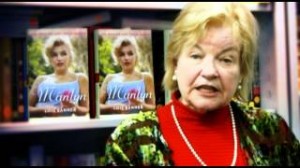 I really enjoyed talking to Ms. Banner and wished we had more time available to talk together about this book.
I really enjoyed talking to Ms. Banner and wished we had more time available to talk together about this book.
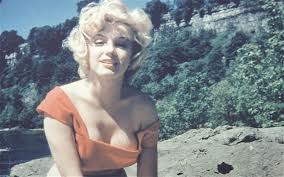
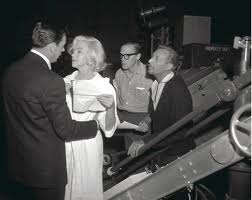
Podcast: Play in new window | Download
Craig Johnson: The Cold Dish (The Walt Longmire Series)
August 28, 2012 by David
Filed under Fiction, WritersCast
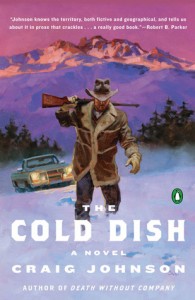 978-0143123170 – Penguin Books – Paperback – $15.00 – ebook editions available
978-0143123170 – Penguin Books – Paperback – $15.00 – ebook editions available
What a great discovery! This is really about an entire series of novels, not just this first book, The Cold Dish (which is exceptional, by the way). As soon as I started reading this novel, I was hooked, and knew I would be reading and enjoying many more of Craig Johnson’s novels. Out of the seven he has published thus far, I’ve read four this summer, and I would have read more of them if I had not been distracted by a very busy period with lots of intense work. So I am actually looking forward to this fall and winter when I can sit by the proverbial fire and read three more really good books.
As Craig said when we talked, this series of books is driven by his characters, and it’s true enough, everyone in these books is vividly drawn and incredibly alive. That’s what got A&E Television to buy the books to turn into their latest successful television series, a story Craig definitely enjoys telling. Walt Longmire, the Sheriff of Absaroka County, Wyoming, is one of the great modern heroes, full of flaws and the kind of intrepid it’s impossible not to love. And unusually for me, at least, I don’t mind at all the way these books have been adapted for television. A&E wisely kept them character based, and while it is plainly impossible for any video medium to be as imaginatively rich as a great novel, they’ve done a terrific job with Longmire.
Author Johnson is plainly having a great time writing these novels, and well he may. He’s created a cast of characters it’s impossible not to be attracted to. The Cold Dish introduces us to Walt Longmire, a twenty-five year veteran sheriff in the least populated county in Wyoming, his best friend, Henry Standing Bear, and his favorite deputy, Philadelphia-born Victoria Moretti. Longmire is not an altogether happy man, having lost his beloved wife, and now lives alone in what might loosely be called an unfinished house. His daughter is away in law school and he is mostly alone. His peaceful unhappiness is interrupted by the death of Cody Pritchard, a young man who had previously been involved in an ugly incident of rape two years earlier with three other high school boys, all of whom had been given suspended sentences for raping a local Cheyenne girl. He’s shot at long distance by an unusual and historic 45-70 Sharps buffalo rifle. Thus starts an adventure that can only be called gripping and powerful. As one reviewer said: “Longmire faces one of the more volatile and challenging cases in his twenty-four years as sheriff and means to see that revenge, a dish that is best served cold, is never served at all.”
Johnson is a fine literary writer taking on a popular form and making it his own. The Longmire series is the kind of book series readers love, and it’s just as attractive to those who are seeking adventure between book covers. Talking to Craig about his books was a true pleasure for me. Craig lives in Ucross, Wyoming, population 25, where he truly lives the kind of life he writes about.
Author website here. A&E Longmire site here.
The book series:
The Cold Dish
Death Without Company
Kindness Goes Unpunished
Another Man’s Moccasins
Junkyard Dogs
Hell is Empty
As the Crow Flies
Podcast: Play in new window | Download
Atina Diffley: Turn Here, Sweet Corn
August 16, 2012 by David
Filed under Non-Fiction, WritersCast
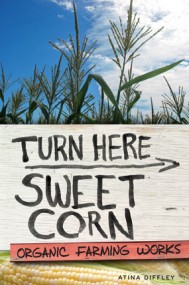 Turn Here Sweet Corn: Organic Farming Works – 978-0816677719 – University of Minnesota Press – Hardcover – $24.95 (ebook versions available)
Turn Here Sweet Corn: Organic Farming Works – 978-0816677719 – University of Minnesota Press – Hardcover – $24.95 (ebook versions available)
As I write this, it’s August, 2012, and sweet corn is beginning to be abundant here in Connecticut, where I live. This is my favorite season, and my favorite summer vegetable too. When I discovered this wonderful book, I picked it up immediately, and began to read it voraciously. I really like this book, and corn is, of course, an evocation of much more for the author and her readers. Atina Diffley has a great story to tell, and she tells it well in this lovely, powerful, evocative book.
Atina’s story is literally grounded by her connection to the earth and to living in community. As she tells us, she has always wanted to farm. As she has worked with the land to grow food, she has learned how farming is a synthesis of land and people. Wherever she is, along with her farmer husband, Martin, she is a sensitized and active member of her the ecosystem, paying close attention to the living world around her. It’s a great lesson for a world that seems alienated from the natural world. Atina tells us about how she came to being a local organic farmer, a story of farming within close range of the Minneapolis/St. Paul urb for more than thirty years. It’s been an incredible struggle, but also, an incredible success, as she shows how a conscious connection between farm and city, between farmer and the food system can create healthy systems that last. There are many practical lessons as well as inspiration, beauty, and sustenance here for anyone interested in building a new food system in America.
And in addition to a brilliant and beautiful story of land and living, Atina also tells the incredible story of the battle she and Martin led against the Koch brothers pipeline across Minnesota. It’s more or less mind boggling to imagine what they went through, and inspiring to see that it is possible for intelligent and organized opposition to powerful corporate forces can in fact be victorious – right over might.
This is a great book and one I am very happy to recommend to friends, family and colleagues. Talking to Atina about her book was a great pleasure for me, and I hope our conversation will be illustrative of how wonderful this book is. And thanks to the courageous and intelligent University of Minnesota Press for publishing this terrific memoir (a terrific publisher!). Having sold the farm to the food cooperatives that supported it for so many years, Atina is now an organic consultant and public speaker on farming and food issues. Her website is here.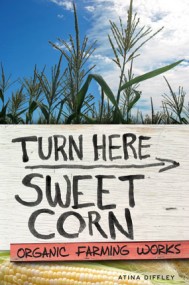 We had a great interview in which we covered a wide range of subjects related to her book and to the important issues she raises about our connection to the land, to food, to the reason why organic farming is so important, and to the meaning of food to our lives.
We had a great interview in which we covered a wide range of subjects related to her book and to the important issues she raises about our connection to the land, to food, to the reason why organic farming is so important, and to the meaning of food to our lives.
Podcast: Play in new window | Download
Robin Gaby Fisher: The Woman Who Wasn’t There
July 25, 2012 by David
Filed under Non-Fiction, WritersCast
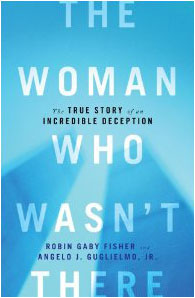 978-1451652086 – Touchstone – Hardcover – $26 (ebook edition available at lower prices)
978-1451652086 – Touchstone – Hardcover – $26 (ebook edition available at lower prices)
You really need to know the subtitle of this book to get the full impact – The Woman Who Wasn’t There: The True Story of an Incredible Deception. It is an incredible story, about a woman who became one of the leaders of the 9/11 survivors movement, who then turned out to be a complete fraud. How she managed to convince so many people of a story that was so much a part of our public experience (and so much a part of the terrible private experiences of other survivors and family members) is what makes this book compelling.
Journalist Robin Gaby Fisher wrote this book with Angelo J. Guglielmo, Jr., a documentary film-maker who was very close to the main character of the book and who was part of the story itself.
Tania Head told a dramatic and heart stopping story of survival from an upper floor of the World Trade Center, and quickly rose to a position as leader at an early stage in the development of the World Trade Center Survivors’ Network. She became a prominent public figure helping to establish the group, gave a public face to the survivors’ group, and was deeply emotionally involved in the lives of hundreds of people. Until her story unraveled and the truth became known.
It is a tricky thing for a writer to maintain the reader’s interest when the end of her story is already known – Fisher handles this problem successfully by painting an engrossing and detailed picture of Tania Head and all the people around her, and by keeping us waiting for the important details of how her story actually came apart. And while it is impossible for anyone to truly know and understand Tania, who will not speak publicly about anything at all, Fisher paints a deft portrait of a complex psychological being, who joins a long list of famous public frauds who have taken on personae that did not factually belong to them but whose beings were poured into their fantasies in service of deeply felt emotional needs.
It’s also hard not to wonder about the human need for heroes and leaders, which these sorts of confidence men and women prey on. This could happen to any of us, and perhaps especially when we are ourselves emotionally vulnerable and desperate for someone to show us the better side of the human spirit. In many ways, this story illuminates more about the nature of human suffering and stress than it could ever help us to understand the perpetrator of the fraud itself. It’s a very rewarding book to read and my discussion with Robin Gaby Fisher about the book will illuminate some of the important issues raised in her book.
Robin Gaby Fisher is a two-time finalist for the Pulitzer Prize in Feature Writing and a member of a Pulitzer Prize-winning team at the Newark Star-Ledger. She teaches Journalism at Rutgers University in Newark, New Jersey.
Podcast: Play in new window | Download
Bill Bradley: We Can All Do Better
July 4, 2012 by David
Filed under Non-Fiction, WritersCast
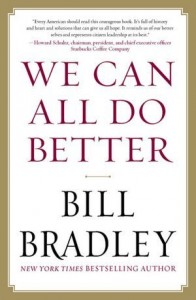 978-1593157296 – Vanguard Press – Hardcover – $24.99 (ebook versions available at lower prices)
978-1593157296 – Vanguard Press – Hardcover – $24.99 (ebook versions available at lower prices)
Bill Bradley is one of my favorite contemporary politicians. I felt badly for all of us when he left the national political scene and then went to work in investment banking. Much like another politician I admire, Mario Cuomo, he is smart, well versed in a wide range of subjects, able to communicate complicated ideas without dumbing them down, and above all, he is passionately a humanist, who clearly likes people, and loves what America could and should be, as a leader on the world stage.
While I certainly do not agree with all of his ideas, what he has to say is well worth paying attention to, especially since he is so intelligent, and his arguments are so well reasoned, grounded in ideas and carefully constructed (how novel!) Moreover, he represents what the current political discourse so desperately needs, namely leadership that does not trivialize, demonize or mock those with whom one disagrees.
Bradley believes deeply in the power of citizens to make change, and dispensing with so much of what goes for political discourse these days, in We Can All Do Better Bradley makes a strong case for why America cannot continue on its current deeply divided, politically gridlocked, and ineffectual political, social and foreign policy paths.
Bradley first reviews the current “state of the nation.” He makes clear that, contrary to right wing pronouncements, government is not the cause of our problems. He rightly points out the damaging and dangerous role of money and politics, talks cogently about why and how our existing foreign policy, electoral, and economic paths will lead to a dismal future for America, and sets forth clearly and coherently what needs to be done to for us to make changes for the better.
As the book title says, “we can all do better.” Rather than blaming and scapegoating (groups of other citizens, the other political party, or just government itself) or as so many do, simply ignoring what we don’t like, and disengaging from the political process, Bradley continually and powerfully makes his case we can all—elected officials and private citizens alike—do a better job together. Bradley is a great voice for uniting rather than dividing, for working together, and for allowing ourselves to see more clearly who we are – and can be – as citizens and participants in the modern world.
Bill Bradley, born and raised in Missouri, was a star basketball player at Princeton, a Rhodes scholar, and then had a Hall of Fame career in the NBA. He was a three term senator from New Jersey, and ran for president in 2000. We Can All Do Better is his sixth book. He’s been involved in investment banking and serves as a corporate director for a number of companies. He hosts a radio show called American Voices on Sirius/XM satellite radio.
(“For 40 years, I’ve traveled around America listening to the stories Americans tell about their lives. I was always moved, and so I wanted to create a show where you can hear some of them too.” – Sen. Bill Bradley)
It was a great pleasure for me to have the opportunity to speak to Senator Bradley about We Can All Do Better for Writerscast. You can learn more about the book at Sen Bradley’s website.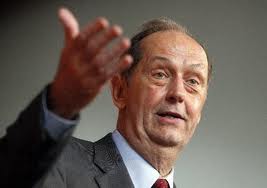
Podcast: Play in new window | Download
E. Ethelbert Miller: The Fifth Inning
June 21, 2012 by David
Filed under Non-Fiction, WritersCast
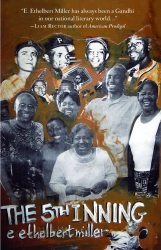 978-1604865219 – PM Press – Paperback – $15.95 (ebook versions available at lower prices)
978-1604865219 – PM Press – Paperback – $15.95 (ebook versions available at lower prices)
E. Ethelbert Miller is a writer and literary activist. He is currently the board chairperson of the Institute for Policy Studies (IPS). Since 1974, he has been the director of the African American Resource Center at Howard University. Ethelbert is also the former chair of the Humanities Council of Washington, D.C. and a former core faculty member of the Bennington Writing Seminars at Bennington College. He’s published more than ten books, in both poetry and prose, has edited a number of anthologies, and his writing is widely anthologized. He’s won all sorts of awards and recognition for his writing and for his longstanding work in support of writing as a community and cultural effort. In addition, for several years he hosted the popular weekly radio program Maiden Voyage on WDCU-FM, as well as Vertigo On The Air on WPFW.
Ethelbert has long been a favorite poet of mine, whom I got to know years ago when I lived in Washington, D.C., where Eth still resides. We’re of a similar age and share various passions, not the least of which is baseball.
So it is no wonder that I jumped at the chance to read his memoir, The Fifth Inning, and then to talk to him about it on Writerscast. This is a terrific book, unusual in its shape and structure, which is both poetically charged and carefully built. Ethelbert allows himself to write honestly and purely about his own life, his insecurities, pain and suffering, but without ever becoming self indulgent or overwrought. There is always hope, and the sense that something good, or even great, will come from all this “stuff” we go through in life.
Thinking of a baseball game, the fifth inning out of nine is, of course, the turning point. After the fifth inning, a game can end early but still be considered an official game – a life lived, though abbreviated. So here he is, in the fifth inning of his imagination, looking back at the beginning of the game, and at the present where it’s about to start the last stretch toward the end and the final score. It’s a good time to take stock and get ready to see what you can do to get past the hitters coming up to bat. When you’re pitching you need to pace yourself, remember what worked and didn’t work in the early innings, and use what you have learned to keep the hitters off stride and getting the outs you need to win the game.
Poets’ memoirs are sometimes brittle and too carefully built to sustain a personal story. Ethelbert is not that kind of poet. He’s active and alive in every moment, and brings his readers right into his head and heart. This is a beautifully constructed and written piece of personal writing that I hope will find a audience far beyond the literary community. What Ethelbert has to say about being human and growing older is important for all of us to hear.
Ethelbert’s website is here, well worth a visit. And I wanted to mention that this is a Busboys & Poets book published by PM Press, a publisher I hope readers will learn about and support. Buy the book direct from the publisher to support independent publishing and alternative culture.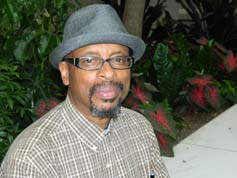
Podcast: Play in new window | Download
Joel Primack and Nancy Abrams: The New Universe and the Human Future
June 3, 2012 by David
Filed under Non-Fiction, WritersCast
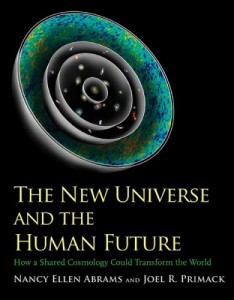 978-0300181241 – Yale University Press – paperback – $20 (ebook versions available)
978-0300181241 – Yale University Press – paperback – $20 (ebook versions available)
This was an exciting and extraordinary book for me to take on. At the very moment I discovered Joel Primack and Nancy Abrams’ cool new book The New Universe and the Human Future, I was also discovering Big History and working on a book project that relates exactly to the ideas in this book. So it was a lucky coincidence for me to find this book and even better to have the chance to speak with the authors. My first two-author interview also, which was fun, not the least because Joel and Nancy work brilliantly together.
I suspect I learned more about the universe from this book than from anything else I have read in my entire life – and I thought I had been pretty good about keeping up with Big Science over the past thirty years or so.
In The New Universe, Nancy Abrams, a cultural philosopher and Joel Primack, an astrophysicist—combine their knowledge and experience to present the most accurate possible portrayal of our current understanding of the universe in which we live. It’s pretty stunning to realize that we are indeed time travelers, since we are able to see the history of the universe in light as it reaches us. And to understand the scale of time in which humans are so small.
But Abrams and Primack are after more than just telling what scientists know and what cosmologists understand about the universe and our place in it. By showing us the absolute miracle of human life on planet Earth, they infuse a scientifically grounded spirituality into the core of our understanding. While they quickly dispense with any notions of Biblical literalism that are disproven by the physical facts that science has uncovered about space and time, cosmology and biology, what they want to show us is that it is possible for the world now to finally share a scientifically grounded creation story. Whereas today we seem to have highly fragmented and differing worldviews that prevent us from living intelligently on our small planet, by understanding how unique our planet and we as a species are in the universe, and how we got here, we may yet be able to unite to save ourselves from extinction. Knowing that it is likely that this is the the only planet able to foster intelligent life does force us to acknowledge our responsibilities not only to ourselves but to the universe we inhabit.
The book is full of incredible information and insights, brilliantly illustrated, our creation story well told. I find myself going back to it frequently as the richness of information the authors share calls out to be re-read. And there’s a great website for the book that I recommend visiting as well.
Nancy Ellen Abrams is an attorney, cultural philosopher, and lecturer at the University of California, Santa Cruz. Joel R. Primack, Distinguished Professor of Physics at the UC Santa Cruz, is one of the principal creators of the modern theory of the universe on the grand scale. Together they have authored several books, including The View From the Center of the Universe. They live in Santa Cruz, California.
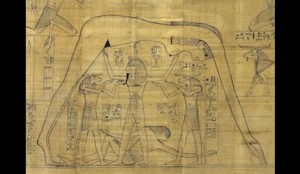

Podcast: Play in new window | Download
Jessica Maria Tuccelli: Glow (a novel)
May 22, 2012 by David
Filed under Fiction, WritersCast
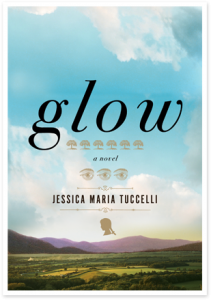 978-0670023318 – Viking – Hardcover – $25.95 (ebook versions available)
978-0670023318 – Viking – Hardcover – $25.95 (ebook versions available)
Jessica Maria Tuccelli’s outstanding first novel, Glow, opens in the fall of 1941, in Washington, D.C., and traverses back and forth through time and place to Hopewell County, Georgia in 1836, and then across the century following. We start with Amelia J. McGee, a young woman of Cherokee and Scotch-Irish descent, an outspoken pamphleteer for the NAACP, whose husband has been hauled off to jail as a draft protester, sending her daughter Ella, alone with her only her dog as company, on a bus home to Georgia. This desperate act, meant to protect her daughter, turns out to be disastrous, as the girl, almost at her destination, is snatched by two drifters and then left for dead.
Ella is rescued and cared for by Willie Mae Cotton, an ancient root doctor and former slave, and her partner, Mary-Mary Freeborn, who live deep in the Takatoka Forest near Ella’s ancestral home. While Ella heals, in a fluid and beautifully told story, we learn the history of her people and those who are caring for her.
Tuccelli is a lovely writer, and her almost magical ability to capture the voices and stories of the diverse characters in this novel is striking. She does not shy away from pain and suffering, but manages to find transcendance and hope for her characters against tremendous odds. The people in this novel are powerfully real, committed to family, to the land, and to the personal histories that make them who they are.
Tuccelli is a fine writer and also a terrific writer to interview. It’s of course impressive and a natural issue to discuss, that she is not from Georgia nor does she share any personal history with the people and place she has made her own in this novel. There are some truly compelling characters in this book that I will never forget. I had a great time talking to her and hope you enjoy our conversation as well. Her excellent website is well worth a visit.
Podcast: Play in new window | Download
Shama Hyder Kabani: The Zen of Social Media Marketing
May 3, 2012 by David
Filed under Non-Fiction, WritersCast
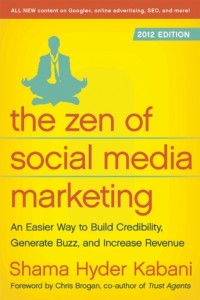 978-1936661633 – Ben Bella Books – $16.95 – paperback (ebook versions are available)
978-1936661633 – Ben Bella Books – $16.95 – paperback (ebook versions are available)
If you’re involved in any business or any form of communication arts or entertainment, you already know that social media has rapidly become the buzz term of the new century. Increasing numbers of people all over the world spend hours a day online in some level of engagement on Facebook, Twitter, Linked In, Tumblr and now Pinterest. That the book I am talking about here, The Zen of Social Media Marketing: An Easier Way to Build Credibility, Generate Buzz, and Increase Revenue, is an updated 2012 edition of a book first published less than two years ago, indicates how dynamic and fast changing online social media have become.
Over the last four or five years, I have voraciously read or skimmed any number of books that cover either specific social media platforms, or more broadly on social media marketing and strategies for businesses and professionals. Quite a few of them were very good and taught me valuable lessons. None, however, was as penetrating and inspiring as this book. Author Kabani deeply understands how social media marketing is so different from traditional marketing – and requires a very different approach from anyone attempting to “use” social media for their business or profession. Zen is the right term.
Shama Kabani started her own marketing business, The Marketing Zen Group, right out of graduate school, and built it into a successful operation, learning as she went. Her company used social media to attract clients; she practices what she preaches. In the book, Shama lays out her basic principles, contrasting the conversational and participatory approach of social media marketing to the megaphone approach of traditional product marketing that worked in the one way world of broadcast and publishing media for so many years. Her core structure is compelling and simple: ACT: Attract followers, Convert them to consumer or customer, Transform your successes into magnetic attraction.
Throughout the book, Shama features anecdotes, guest experts in a wide range of subjects providing useful advice, and a steady stream of really powerful tools and behaviors that will help anyone from beginner to expert become a better social media participant and therefore a marketer. For many businesses, becoming adept at working in social media has been the magic that has helped them succeed and thrive in a challenging and constantly changing environment. I do believe that if you only have time to read one book on social media, this is the one to have. So many of your customers (and potential customers) are so deeply involved with social media, you cannot afford to ignore them.
Talking to Shama was great fun, highly rewarding for me, and I think this interview will be useful and extremely valuable to all. Writers and publishers in particular will find this conversation of particular value. You can reach Shama directly in a variety of ways:
Email: shama@marketingzen.com; Facebook; Twitter; LinkedIn; Google+ 
Please post comments and any ideas and suggestions this discussion engenders.
Podcast: Play in new window | Download
Scott Crow: Black Flags and Windmills
April 19, 2012 by David
Filed under Non-Fiction, WritersCast
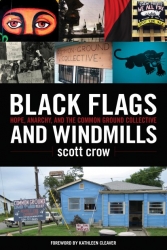 978-1604860771 – PM Press – paperback – $20.00.
978-1604860771 – PM Press – paperback – $20.00.
I knew I would be interested in reading Black Flags and Windmills after reading the publisher’s description of this book:
When both levees and governments failed in New Orleans in the Fall of 2005, scott crow headed into the political storm, co-founding a relief effort called the Common Ground Collective. In the absence of local government, FEMA, and the Red Cross, this unusual volunteer organization, based on ‘solidarity not charity,’ built medical clinics, set up food and water distribution, and created community gardens. They also resisted home demolitions, white militias, police brutality and FEMA incompetence side by side with the people of New Orleans.
crow’s vivid memoir maps the intertwining of his radical experience and ideas with Katrina’s reality, and community efforts to translate ideals into action. It is a story of resisting indifference, rebuilding hope amidst collapse, and struggling against the grain. Black Flags and Windmills invites and challenges all of us to learn from our histories, and dream of better worlds. And gives us some of the tools to do so.
This short description made me realize that I had not really thought about what it was like in New Orleans and the Gulf Coast during and after Katrina, beyond the media images of human suffering and devastation we all saw on television and online. And that I really had no idea what was going on there in the weeks and months after this massive dislocation. I think I suspected that things were pretty grim, but I wanted to learn more first hand.
crow is an anarchist organizer who went to New Orleans immediately after the storm hit, mainly to look for a colleague and friend he knew had stayed in the city throughout. His story about the early days there, where he and a few other people tried to assist, outside of all official structures and organizations, is mind blowing and powerful. But the ongoing story of the work that he and others did to help create community based self-help structures is really at the heart of his memoir, and is at once uplifting and inspiring for anyone who is searching for ideas and principles that will help us, not just in times of stress and turmoil, but all of the time and forever, as we try to find better ways to build community and live together on a crowded planet without falling into authoritarian and top down structures and systems.
No doubt that not every reader will agree with everything that scott believes in and does, but this is a valuable story for anyone interested in how human beings can work together for the common good.
Here’s his official bio, for those who want to know more about his background and current work: scott crow is an Austin, TX based anarchist community organizer, writer, and trainer who began working on anti-apartheid, international political prisoner and animal rights issues in the mid 1980s. He is the co-founder and co-organizer of several social justice groups and education projects throughout Texas and the South including Common Ground Collective (with Malik Rahim), Radical Encuentro Camp, UPROAR (United People Resisting Oppression and Racism), Dirty South Earth First!, and North Texas Coalition for a Just Peace. He has trained and organized for Greenpeace, Ruckus Society, Rainforest Action Network, A.C.O.R.N., Forest Ethics, and Ralph Nader, and many smaller grassroots groups. He is currently collaborating on long-term sustainable democratic economic mutual aid projects within Austin.
This is a talk that I think is well worth a listen.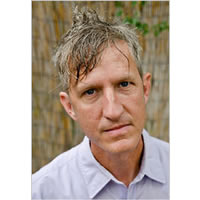
Podcast: Play in new window | Download

